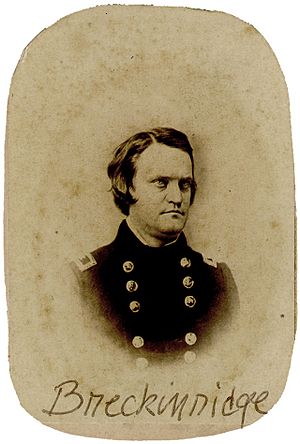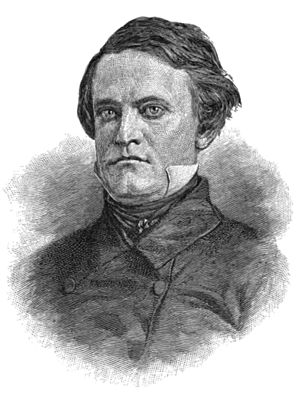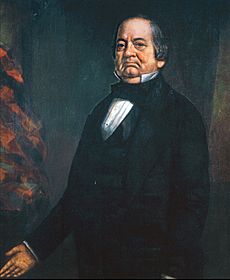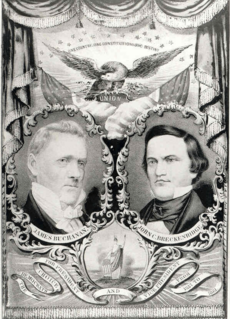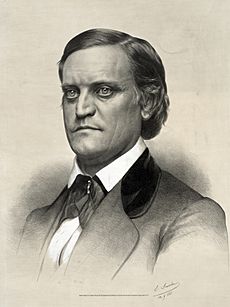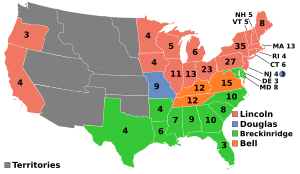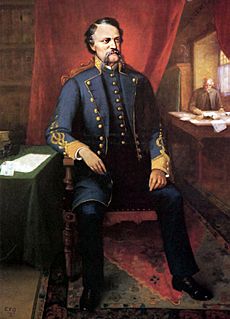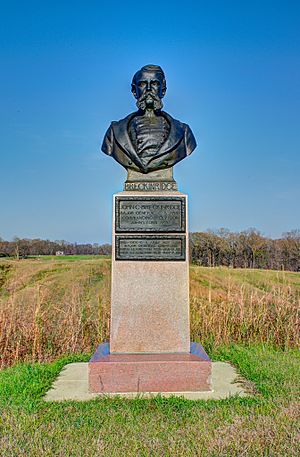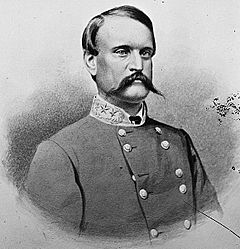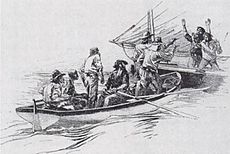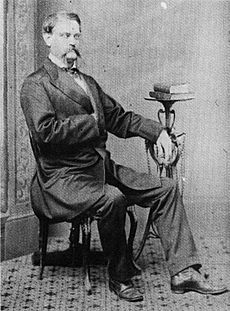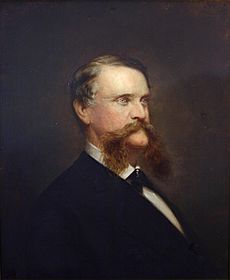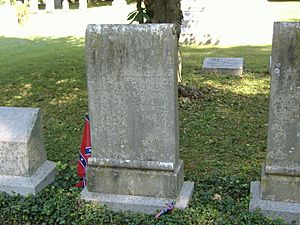John C. Breckinridge facts for kids
Quick facts for kids
John C. Breckinridge
|
|
|---|---|
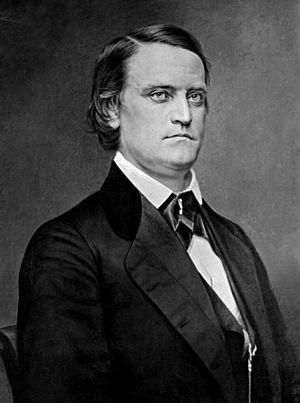
Breckinridge in 1860
|
|
| 14th Vice President of the United States | |
| In office March 4, 1857 – March 4, 1861 |
|
| President | James Buchanan |
| Preceded by | William R. King |
| Succeeded by | Hannibal Hamlin |
| 5th Confederate States Secretary of War | |
| In office February 6, 1865 – May 10, 1865 |
|
| President | Jefferson Davis |
| Preceded by | James Seddon |
| Succeeded by | Position abolished |
| United States Senator from Kentucky |
|
| In office March 4, 1861 – December 4, 1861 |
|
| Preceded by | John J. Crittenden |
| Succeeded by | Garrett Davis |
| Member of the U.S. House of Representatives from Kentucky's 8th district |
|
| In office March 4, 1851 – March 3, 1855 |
|
| Preceded by | Charles Morehead |
| Succeeded by | Alexander Marshall |
| Member of the Kentucky House of Representatives from Fayette County |
|
| In office 1849–1850 |
|
| Personal details | |
| Born |
John Cabell Breckinridge
January 16, 1821 Lexington, Kentucky, U.S. |
| Died | May 17, 1875 (aged 54) Lexington, Kentucky, U.S. |
| Resting place | Lexington Cemetery |
| Political party | Democratic |
| Spouse |
Mary Burch
(m. 1843) |
| Children | 7, including Clifton and John |
| Parent |
|
| Relatives | Breckinridge family |
| Education |
|
| Signature | |
| Military service | |
| Allegiance |
|
| Branch/service | |
| Years of service |
|
| Rank |
|
| Battles/wars | |
John Cabell Breckinridge (born January 16, 1821 – died May 17, 1875) was an American lawyer, politician, and soldier. He was from Kentucky. He served in both houses of the U.S. Congress. At 36, he became the 14th and youngest-ever Vice President of the United States. He served from 1857 to 1861.
Breckinridge was a member of the Democratic Party. He was a U.S. Senator when the American Civil War began. He was removed from the Senate after joining the Confederate Army. In 1865, he was made Confederate Secretary of War.
Breckinridge was born into a well-known family near Lexington, Kentucky. He served in the Mexican–American War as a non-fighter. In 1849, he was elected to the Kentucky House of Representatives. There, he supported "states' rights," meaning states should have power over their own laws, especially regarding slavery.
In 1851, he was elected to the U.S. House of Representatives. He supported the Kansas–Nebraska Act, which allowed people in new territories to decide on slavery. After his district was redrawn in 1854, he decided not to run again. In 1856, he was chosen as the Vice President candidate with James Buchanan. They won the election.
As Vice President, Breckinridge had little power. He supported a pro-slavery plan for Kansas, which caused a split in the Democratic Party. In 1859, he was elected to the U.S. Senate.
In 1860, the Democratic Party split over slavery. Different groups nominated Stephen A. Douglas and Breckinridge for president. A third party nominated John Bell. These three split the Southern vote. Abraham Lincoln, who was against slavery, won most of the Northern votes and became president. Breckinridge won most Southern states.
When he became a Senator, Breckinridge tried to find a way to keep the country together. But when Confederate forces moved into Kentucky, he fled and joined the Confederate Army. He was made a general and later Secretary of War. After the war, he lived outside the U.S. for a few years. He returned to Kentucky in 1868 after a general pardon. He chose not to return to politics. He died in 1875.
Early Life and Education
Growing Up in Kentucky
John Cabell Breckinridge was born on January 16, 1821. His family lived at Thorn Hill, their estate near Lexington, Kentucky. He was the fourth of six children, and the only son of Joseph "Cabell" Breckinridge and Mary Clay (Smith) Breckinridge.
His mother's grandfather, John Witherspoon, signed the Declaration of Independence. John's father was Kentucky's Secretary of State. One month after John was born, his family moved to Frankfort. This was so his father could do his job better.
In 1823, an illness spread in Frankfort. John's father died, but his mother survived. His father's debts meant his family had little money. John, his mother, and siblings moved to Lexington. They were supported by his grandmother.
Learning and College
While in Lexington, Breckinridge went to Pisgah Academy. His grandmother taught him about politics. She shared the ideas of her late husband, John Breckinridge. He had been a U.S. Senator and Attorney General. His grandfather had supported "states' rights." This idea said states had strong powers, even to reject federal laws.
In 1832, John moved to Danville, Kentucky. He lived with his sister and her husband, John C. Young. Young was the president of Centre College. John enrolled there in November 1834. He earned a Bachelor of Arts degree in 1838.
After college, he spent a winter at the College of New Jersey (now Princeton University). In 1839, he returned to Kentucky. He began to "read law" with Judge William Owsley. This meant he studied law under an experienced lawyer. In 1840, he joined Transylvania University's law program. He earned a law degree on February 25, 1841. The next day, he was allowed to practice law.
Starting a Law Career
Breckinridge stayed in Lexington to decide where to start his law practice. He borrowed law books from John J. Crittenden. He felt Lexington had too many lawyers. So, he moved to Frankfort, but couldn't find an office.
In October 1841, he and a friend, Thomas W. Bullock, went to the Iowa Territory. They hoped to find better chances there. They thought about settling in Jacksonville, Illinois. But they found many good lawyers there already, like Stephen A. Douglas and Abraham Lincoln.
They continued to Burlington, Iowa. By 1843, Breckinridge's law firm was doing well. He joined the Democratic Party. Most of his family in Kentucky were Whigs.
Breckinridge visited Kentucky in May 1843. He met Mary Cyrene Burch, his friend's cousin. They got engaged in September. In October, he closed his business in Iowa. He returned to Kentucky and started a law firm with Samuel Bullock.
He married Mary on December 12, 1843. They settled in Georgetown, Kentucky. They had six children. In 1845, Breckinridge moved his family back to Lexington. He started a new law firm with James B. Beck, who later became a U.S. Senator.
Mexican–American War Service
Breckinridge supported the Mexican–American War. He wanted to join the staff of Major General William Orlando Butler. Butler was a well-known Kentucky Democrat. But Butler could only offer him an unpaid helper role.
In July 1847, Breckinridge gave a speech at a military funeral in Frankfort. It honored Kentuckians who died in the Battle of Buena Vista.
He applied for a military job again in August 1847. Kentucky's governor, William Owsley, needed more regiments. Owsley's advisors wanted him to pick at least one Democrat. Senator John J. Crittenden supported Breckinridge. On September 6, 1847, Owsley made Breckinridge a major in the Third Kentucky Infantry Regiment.
The regiment left Kentucky on November 1. They reached Vera Cruz, Mexico, by November 21. A serious illness, yellow fever, broke out. The regiment quickly moved to Mexico City. They arrived on December 18. The fighting was almost over. They stayed as an occupation army until May 30, 1848. Breckinridge walked most of the way. He let tired soldiers use his horse.
He was more needed for his legal skills than military training. He helped defend Gideon Johnson Pillow in a court case. Pillow was accused of trying to make himself look better than General Winfield Scott. Breckinridge's role was small.
The Third Kentucky returned to Louisville on July 16. They were released from service on July 21. Over 100 of their 1,000 men died from illness in Mexico. Breckinridge saw no combat. But his military service helped his political career in Kentucky.
A Young Politician
Starting in the Kentucky House
Breckinridge campaigned for Democratic presidential candidate James K. Polk in 1844. In 1845, some Democrats wanted him to run for Congress. He said no and supported another candidate. He was against the Wilmot Proviso, which would have banned slavery in new territories.
In August 1849, Kentuckians elected delegates for a new state constitution. They also elected state representatives. Breckinridge's uncles were against slavery. But a group of pro-slavery citizens nominated Breckinridge for the House of Representatives. Breckinridge owned five slaves at this time. He said he was against "impairing in any form" the legal protection of slavery.
Breckinridge won the election with 1,481 votes. This was the first time Fayette County elected a Democrat to the state House. He started a new law firm. He also helped start a Democratic newspaper. He met Mary Todd Lincoln, his cousin, and her husband, Abraham Lincoln. They became friends despite their political differences.
When the House met, Breckinridge got many votes for Speaker. But he didn't get enough to win. He withdrew, and a Whig became Speaker. Breckinridge led the House Democratic group. He supported bills for internal improvements, like roads and canals.
Congress was debating the Compromise of 1850. This was a plan to settle the slavery issue in new U.S. territories. Breckinridge believed the federal government should not interfere with slavery in states or territories. He wrote a report saying this.
On March 4, 1850, Breckinridge took time off. His son, John Milton, was sick and died on March 18. To cope with his sadness, he stayed busy. He urged people to approve the new state constitution. He declined to run for re-election, partly due to his grief and financial needs.
First Time in the U.S. Congress
In January 1851, Breckinridge decided to run for Congress. He ran in Kentucky's Eighth District. This area was a stronghold for the Whig Party. His opponent, Leslie Combs, was popular. Combs was expected to win easily.
In April, the candidates debated. In May, they traveled the district, giving daily speeches. Breckinridge spoke about his "strict constructionist" view of the U.S. Constitution. This meant he believed the government should only do what the Constitution clearly says. He was against high tariffs (taxes on imports). He said "free thought needs free trade." His strong voice and charm helped him.
On election day, he won by 537 votes. Democrats won five of Kentucky's 10 congressional districts. Lazarus W. Powell became the first Democratic governor since 1834.
Breckinridge was suggested for Speaker of the House. But he refused and voted for another Kentuckian, Linn Boyd. Breckinridge was assigned to the Committee on Foreign Affairs. He defended William Butler, a presidential candidate, from attacks. This helped his own reputation. He spoke more in debates after this.
He defended the Fugitive Slave Act of 1850. This law required people to return escaped slaves. He was against a plan to give free land to settlers. He worried it would create more territories that banned slavery. He also worked to get more federal money for Kentucky's rivers and harbors.
Re-election Challenges
The Whigs wanted to win Breckinridge's seat back. They nominated Robert P. Letcher, a former governor. Letcher had won 14 elections without a loss. Both candidates campaigned hard, giving many speeches daily. Letcher was experienced but could get angry. Breckinridge gave calm, well-reasoned speeches.
Cassius Clay, an enemy of Letcher, supported Breckinridge. Letcher tried to say Breckinridge was against slavery. But Breckinridge showed his consistent support for slavery. He defeated Letcher by 526 votes.
Breckinridge was one of 80 members re-elected to the Thirty-third Congress. He was assigned to the important Ways and Means Committee. He supported President Pierce's pro-slavery plans. He believed states had the right to decide on slavery. He thought states could leave the Union, but he was against it as a solution.
He supported Stephen A. Douglas's idea of "popular sovereignty." This meant people in new territories could vote on whether to allow slavery. He thought this would solve the slavery issue nationally. During a debate, a New York representative, Francis B. Cutting, made a remark. Breckinridge thought it was a challenge to a duel. He chose rifles at 60 paces. Cutting chose pistols at 10 paces. Friends stepped in and stopped the duel. This saved Breckinridge's political career. Kentucky law said anyone in a duel could not hold office.
Leaving Congress
In February 1854, the Whigs in Kentucky redrew Breckinridge's district. This made it harder for him to win re-election. Also, the Know Nothing Party was growing. He decided not to run again.
President Pierce offered him a job as U.S. Minister to Spain. Breckinridge had wanted this job earlier. But he declined it on February 8, 1855. He said his decision was "of a private and domestic nature." His term in the House ended on March 4.
He wanted to care for his sick wife and make more money. He returned to his law practice in Lexington. He also invested in land in Minnesota and Wisconsin. He also promoted horse racing in Kentucky. He became president of a horse improvement group.
Becoming Vice President
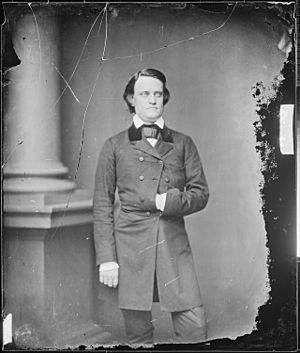
Breckinridge was a delegate at the 1856 Democratic National Convention in Cincinnati. He supported President Pierce for re-nomination. When Pierce's chances faded, Breckinridge supported Stephen Douglas. But Douglas couldn't get enough votes. James Buchanan became the Democratic presidential nominee.
Then, someone suggested Breckinridge for Vice President. This would balance Buchanan's ticket. Breckinridge declined, out of respect for another Kentuckian, Linn Boyd. But on the first vote, Breckinridge got the second-highest number of votes. On the second vote, he was nominated unanimously.
Breckinridge actively campaigned for Buchanan. He gave speeches in several states. He said Republicans were too focused on ending slavery. He warned that their election could break up the Union. His presence helped Democrats win Kentucky for the first time since 1828.
Buchanan and Breckinridge won the election. Breckinridge was 36 when he became Vice President on March 4, 1857. He was the youngest Vice President in U.S. history.
Buchanan didn't like that Breckinridge had supported others first. Their relationship was strained. Buchanan rarely asked Breckinridge for advice. They both supported the Lecompton Constitution. This plan would have made Kansas a slave state without a vote. This angered many Northern Democrats, including Douglas.
Breckinridge was the Senate's presiding officer. This limited his ability to speak in debates. But he earned respect for being fair. On January 4, 1859, he gave the final speech in the Old Senate Chamber. He hoped Congress would find a way to save the Union. He then led a procession to the new chamber.
In 1859, the Kentucky General Assembly chose a new Senator. Breckinridge was chosen over Joshua Fry Bell. In his acceptance speech, Breckinridge supported the Supreme Court's decision in Dred Scott v. Sandford. This ruling said Congress could not stop slavery in territories. He also said John Brown's raid showed Republicans wanted equality for black people or violence. He still urged against secession. But his talk of conflict worried some, including his uncle Robert.
The 1860 Election
By early 1859, some thought Breckinridge wanted to be president. But as late as January 1860, he said he didn't. Douglas believed Breckinridge would run. This, plus Breckinridge's support for a federal slave code, widened the split between them.
At the 1860 Democratic National Convention in Charleston, South Carolina, Breckinridge had supporters. He told them not to nominate him if James Guthrie was still a candidate. After 57 votes, Douglas couldn't get enough support. The convention decided to meet again in Baltimore.
Pro-Southern delegates had walked out of the Charleston convention. They didn't like that the convention didn't support a federal slave code. These delegates held their own convention in Baltimore. On the first vote, Breckinridge got 81 votes. He was then nominated unanimously. Joseph Lane of Oregon was chosen as his running mate.
Breckinridge accepted the nomination. In August, Senator Jefferson Davis tried to get Douglas, Breckinridge, and Bell to all drop out. They would then pick a compromise candidate. Breckinridge and Bell agreed. But Douglas refused.
Opponents said Breckinridge wanted the Union to break up. He denied this in a speech in Frankfort. He said he was devoted to the Constitution and the Union. He had little support in the North. But most Southern states were expected to vote for him. This would give him only 120 electoral votes out of 303.
In the four-way election, Breckinridge came in third in the popular vote. But he was second in the Electoral College. Lincoln won with 180 electoral votes. Breckinridge had 72, Bell 39, and Douglas 12. Breckinridge won the states of the Deep South. But his support there was mostly from rural areas. He also won the border states of Maryland and Delaware. He lost to Bell in his home state of Kentucky.
It was Breckinridge's job as Vice President to announce Lincoln as the winner on February 13, 1861. On February 24, Breckinridge visited Lincoln. He also often visited his cousin, Mary Todd Lincoln, at the White House.
In the time after the election, Congress tried to find a solution. Breckinridge supported the Crittenden Compromise. This plan had constitutional changes to prevent states from leaving. He tried to get it approved, but it failed. On March 4, 1861, Breckinridge swore in Hannibal Hamlin as the new Vice President. Hamlin then swore in the new senators, including Breckinridge.
A Senator During Crisis
Seven states had already left the Union when Breckinridge became a Senator. This left Southern senators outnumbered. He tried to find a compromise to reunite the states. He asked Lincoln to remove federal troops from Confederate states to avoid war.
The Senate session ended on March 28. On April 2, Breckinridge spoke to the Kentucky General Assembly. He continued to push for peaceful reunion. He suggested a meeting of border states to find a solution. But on April 12, Confederate troops fired on Fort Sumter. This ended plans for a conference.
Breckinridge suggested that Kentucky's governor call a meeting. This meeting would decide if Kentucky would join the Union or the Confederacy. On May 10, he was chosen as a delegate to this conference. The delegates recommended that Kentucky stay neutral in the Civil War. They also said Kentucky should arm itself to prevent invasion. Breckinridge agreed to this plan once it was approved.
In June, pro-Union candidates won most of Kentucky's House seats. Breckinridge returned to the Senate in July. Most other senators saw him as a traitor. He said Lincoln's actions were unconstitutional. These included raising an army without Congress's declaration of war and suspending habeas corpus (the right to be brought before a judge). He was the only senator to vote against a resolution allowing Lincoln to use all government resources for the war.
Kentucky's neutrality was broken in early September 1861. Confederate forces invaded on September 3. Union forces followed on September 6. Unionists in Kentucky arrested people suspected of Confederate sympathies. Breckinridge heard that a Union general planned to arrest him. To avoid this, he left Lexington on September 19, 1861. He joined other Confederate supporters and went to Confederate-held Bowling Green, Kentucky.
The state legislature immediately asked him to resign. In a letter on October 8, 1861, Breckinridge said the Union no longer existed. He said Kentucky should be free to choose its own path. He defended his support for the South. He said, "I exchange with proud satisfaction a term of six years in the Senate of the United States for the musket of a soldier." He was accused of treason on November 6, 1861. He had already joined the Confederate army. On December 4, he was officially removed from the United States Senate.
Fighting in the Civil War
Service in the Western Theater
On November 2, 1861, Breckinridge became a brigadier general in the Confederate Army. On November 16, he took command of the 1st Kentucky Brigade. This brigade was nicknamed the Orphan Brigade. Its men felt abandoned by Kentucky's Unionist government.
In February 1862, Confederate forces had to retreat from Bowling Green. Breckinridge was put in charge of the Reserve Corps. On April 6, 1862, General Albert Sidney Johnston attacked Ulysses S. Grant's forces at Shiloh, Tennessee. Breckinridge's reserves joined the Battle of Shiloh. Johnston was killed, but the Confederates pushed Grant's troops back. The next day, Union forces pushed back. Breckinridge's division covered the Confederate retreat. Of his 7,000 troops, 386 were killed and 1,628 were wounded. Breckinridge was among the wounded.
Breckinridge was promoted to major general on April 14, 1862. He joined Earl Van Dorn near Vicksburg, Mississippi. In August, Van Dorn ordered Breckinridge to try and take back Baton Rouge, Louisiana. His forces were reduced by illness. But on August 5, he attacked the Union forces. He captured prisoners and destroyed supplies. He drove Union troops from the city. Without naval support, the Confederates couldn't hold the city. Breckinridge withdrew his troops.
Later that month, Breckinridge secured Confederate control of the lower Mississippi Valley. He took Port Hudson. This helped stop the federal advance down the Mississippi. Meanwhile, General Braxton Bragg was planning to invade Kentucky. Breckinridge was ordered to join him. But by the time he arrived, Bragg was already retreating after a defeat. Breckinridge and his 7,000 men met Bragg at Murfreesboro, Tennessee.
Bragg disliked Breckinridge. He thought Breckinridge's late arrival in Kentucky hurt the Confederate effort. In December, Bragg ordered the execution of a Kentucky corporal for desertion. Breckinridge was upset by this "military murder." He protested Bragg's actions. Many Confederate officers, including Breckinridge, thought Bragg was not a good commander.
Battles in the West
At Murfreesboro, Breckinridge's Division was on the east side of the Stones River. When the Union army attacked on December 31, 1862, Bragg ordered Breckinridge to reinforce him. But a cavalry commander wrongly reported a large Union force on the east bank. Breckinridge was slow to obey Bragg's order. When he finally crossed the river, his attacks were not effective.
On January 2, a Union division crossed the river and took a ridge. This put Confederate lines in danger. Against Breckinridge's advice, Bragg ordered a direct attack on the Union position. Breckinridge wrote that he believed the attack was "very unwise."
Breckinridge's men initially broke the Union line. But Union artillery and fresh troops arrived. In just over an hour, nearly one-third of Breckinridge's troops were killed, wounded, or captured. He reportedly cried out, "My poor Orphans! My poor Orphans!" This brought fame to the Orphan Brigade. Bragg's official report blamed Breckinridge for the defeat. Breckinridge asked for an investigation, but it was denied.
In May 1863, Breckinridge was reassigned. He participated in the Battle of Jackson. This was an unsuccessful attempt to break the siege of Vicksburg. Vicksburg fell on July 4. Breckinridge returned to Bragg's command on August 28, 1863.
On September 19, he led a division in an attack on Union forces at the Battle of Chickamauga in Georgia. Confederate troops broke the Union line. But the main Union army escaped. Of Breckinridge's 3,769 men, 166 were killed, 909 wounded, and 165 missing.
In November, Breckinridge commanded one of Bragg's corps during the Confederate defeat at the Battles for Chattanooga. Bragg took many of Breckinridge's men. This left him with too few forces to stop the Union attack on Missionary Ridge. His son, Cabell, was captured in this battle. Bragg removed Breckinridge from command.
Service in the Eastern Theater
On December 15, 1863, Breckinridge took leave in Richmond. In February 1864, Confederate President Jefferson Davis put him in charge of the Trans-Allegheny Department.
On May 5, General Robert E. Lee ordered Breckinridge to scout federal forces near Winchester, Virginia. With about 4,800 men, including 261 cadets from the Virginia Military Institute, he defeated 6,300 Union men at the Battle of New Market on May 15. This protected Lee's flank and a vital railroad. It was considered one of his best victories.
Breckinridge's troops then reinforced Lee's army. They helped stop Grant's advance at the Battle of Cold Harbor. During the battle, Breckinridge was wounded when a cannonball hit his horse. He was pinned underneath. He later joined General Jubal Early's troops. They saved Confederate forces from an attack at the Battle of Lynchburg.
Early and Breckinridge then cleared Union forces from the Shenandoah Valley. They crossed into Maryland and probed Washington, D.C.'s defenses. They were delayed at the Battle of Monocacy on July 9, but won. They were defeated at the Battle of Fort Stevens on July 11–12. Lincoln watched this fight. This was the only time two former presidential opponents faced each other across battle lines. Early decided to retreat.
On September 19, 1864, Philip Sheridan forced their retreat at the Third Battle of Winchester. After the death of John Hunt Morgan, Breckinridge again took command of the Department of East Tennessee and West Virginia. On October 2, 1864, his troops protected important Confederate salt works at the First Battle of Saltville. The next morning, he found that some soldiers were killing wounded black Union soldiers. He rushed to stop the massacre.
In mid-November, Breckinridge led a raid into northeastern Tennessee. He drove Union forces back to Knoxville at the Battle of Bull's Gap. On December 17–18, he faced a two-pronged attack at the Battle of Marion in Virginia. He resisted until he ran low on ammunition. Union forces damaged Confederate salt works and railroads. After getting more ammunition, Breckinridge drove the Union forces out.
Confederate War Secretary
James A. Seddon resigned as Confederate Secretary of War on January 19, 1865. On February 6, Jefferson Davis appointed Breckinridge to the job. This helped calm growing opposition to Davis. Breckinridge made his office more efficient. He expanded its power to include officer assignments and strategy advice.
His first act was to promote Robert E. Lee to general-in-chief. Lee reported a shortage of food and supplies. Breckinridge recommended removing the commissary general. The new commissary general improved supplies to the troops.
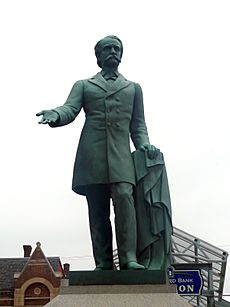
By late February, Breckinridge knew the Confederate cause was hopeless. He began preparing for surrender. Davis wanted to keep fighting. But Breckinridge urged him to arrange a surrender. On April 2, Lee told Breckinridge he had to withdraw from Richmond. This meant Richmond had to be evacuated.
Breckinridge stayed in Richmond to oversee the destruction of facilities and supplies. This was to prevent federal forces from using them. But he did not destroy Confederate records. He wanted them preserved for history. He ordered bridges over the James River to be burned. His son Clifton, serving in the Confederate Navy, joined him.
Breckinridge joined Lee's forces at Farmville, Virginia. He then went to Danville, Virginia. He arrived on April 11 and learned Lee had surrendered on April 9. The Confederate cabinet had already fled. He arrived in Greensboro, North Carolina, on April 13. He advised the cabinet to surrender the remaining Confederate armies. Only Davis and Judah P. Benjamin disagreed.
At Bennett Place, he helped Joseph E. Johnston negotiate surrender with Major General William Tecumseh Sherman. Sherman praised Breckinridge's skills. The initial surrender terms were generous. Washington rejected them. Sherman then offered the same terms as Grant had at Appomattox, which were accepted.
On April 18, Breckinridge heard about the assassination of Abraham Lincoln. Lincoln had died in the Petersen House, where Breckinridge had once lived. Breckinridge was visibly upset. He reportedly said, "Gentlemen, the South has lost its best friend."
On April 28, Breckinridge arrived in Abbeville, South Carolina. He and Brigadier General Basil W. Duke convinced Davis that the war was hopeless. Breckinridge was put in charge of the remaining Confederate treasury gold. He paid some soldiers their wages. He then deposited the rest in banks. He also officially closed the War Department.
Escape and Life Abroad
On May 5, Jefferson Davis officially ended the Confederate Government. Breckinridge discharged most of his escort. He kept a small group of Kentuckians. He tried to create a diversion for Davis to escape. On May 6, his group met a large Federal force. Breckinridge and a small group escaped.
They rode south across Georgia. They reached Milltown (now Lakeland, Georgia) by May 11. Learning of Davis's capture, Breckinridge left with only an aide, a servant, and his son Cabell. On May 15, in Madison, Florida, he met John Taylor Wood, a Confederate Navy captain. They decided to flee to the Bahamas. Cabell was allergic to mosquito bites, so Breckinridge told him to surrender.
At Gainesville, Florida, they found Confederate Colonel J. J. Dickison. He gave them a lifeboat. They traveled down the St. Johns River. They reached Fort Butler on May 29. They continued to Lake Harney. The boat was then moved by wagon to Sand Point (Titusville) on the Indian River. They reached the river by May 31. They had to drag the boat through mud and sandbars.
On June 5, a federal steamer spotted them. They pretended to be hunters. Two days later, they found a larger boat. They took it, giving their old boat and some gold to the owners. With this better boat, they decided to flee to Cuba. They left Fort Dallas. They survived pirates, storms, and lack of supplies. They arrived in Cárdenas on June 11, 1865. A Kentuckian living there recognized Breckinridge. The refugees were given food and a place to stay. The next morning, they traveled to Havana. Breckinridge declined a house offer. He chose to travel to Great Britain with Charles J. Helm, a Confederate agent.
He arrived in Britain in late July. He arranged to communicate with his wife, who was in Canada. He then crossed the Atlantic. He reunited with his wife and children (except Clifton) in Toronto on September 13, 1865. They spent the winter in Toronto. Many other Confederate exiles were there.
The family moved to Niagara in May. In August, doctors suggested France for his wife's health. Cabell Breckinridge returned to the U.S. for business. Mary, aged 12, went to live with relatives in New York. The rest of the family went to Europe. The children attended school in Paris, Versailles, and Vevey, Switzerland. From 1866 to 1868, Breckinridge toured Europe. His wife joined him in Naples, Italy, in February 1868. They met Pope Pius IX in Rome.
Breckinridge wanted to return to the U.S. but feared capture. He moved his family back to Niagara in June 1868. He refused to seek a pardon. But 70 members of the Kentucky General Assembly had asked President Andrew Johnson for one for him. On January 8, 1868, the Louisville City Council asked for assurance that Breckinridge would not be prosecuted. His old law partner, James Beck, told him Johnson would likely issue a general pardon.
Return to the U.S. and Death
Johnson announced amnesty for all former Confederates on December 25, 1868. Breckinridge waited a few weeks in Canada. He wanted to be sure the pardon applied to him. He left Canada on February 10, 1869. He visited family and friends on his way to Lexington. He arrived on March 9. He lived in Kentucky for the rest of his life, renting homes.
Many insurance companies asked Breckinridge to join them. In August 1868, he became manager of the Kentucky branch of Piedmont Life Insurance Company. Washington and Lee University offered him a teaching job, but he declined. He went back to practicing law.
He became general counsel for the proposed Cincinnati Southern Railway. This railroad would connect Cincinnati to Chattanooga through Lexington. He presented his case to the railroad committees. They approved it two years later, and construction began in 1873.
His other railroad plans were less successful. He couldn't get railroads built to his land investments in Wisconsin. As president of the Elizabethtown, Lexington, and Big Sandy Railroad, he got funding from Collis Potter Huntington. This railroad would link Kentucky cities to the Atlantic Ocean. Huntington became president, and Breckinridge became vice president. Only a part of the line was built before a financial crisis in 1873. The full line was finished in 1881.
Breckinridge refused all requests to return to politics. He said he no longer felt "political excitements." He would have needed a two-thirds vote in Congress to hold office again. He never sought this approval. In March 1870, he spoke out against the Ku Klux Klan. In 1872, he supported a state law that allowed black people to testify against white people in court.
By 1873, Breckinridge's health began to decline. He had "pleuro-pneumonia." Surgeries and trips did not help. In May 1875, doctors found his illness was caused by liver problems from war injuries. Fluid filled two-thirds of one lung. On May 11, a surgeon tried to drain the fluid. It brought some relief. Breckinridge completed his will.
Another surgery on May 17 eased his pain. But his condition quickly worsened. He died at about 5:45 p.m., at age 54. Basil W. Duke led the funeral procession to Lexington Cemetery. Breckinridge was buried there.
Legacy
Historical Reputation
As a military commander, some highly respected Breckinridge. He was seen as dignified and honest. People admired his tall, graceful, and handsome appearance. He had a friendly manner, a pleasing voice, and spoke well. He was called the personification of Kentucky chivalry. Observers said he was a "most noble looking man."
Monuments and Memorials
Several towns were named in Breckinridge's honor. These include Breckenridge, Minnesota; Breckenridge, Missouri; Breckenridge, Texas; and Breckenridge, Colorado. The Colorado town changed its spelling when he joined the Confederacy. Fort Breckinridge, Arizona Territory was named for him. Its name was changed during the Civil War, then changed back, and finally changed to Camp Grant after the war. Lyon County, Kansas, was known as Breckinridge County from 1855 to 1862. Breckinridge County, Kentucky is named after his grandfather, not him.
Breckinridge was played by Jason Isaacs in the 2014 film Field of Lost Shoes. This movie showed the Battle of New Market.
A memorial to Breckinridge was placed on the Fayette County Courthouse lawn in Lexington in 1887. In 2015, a committee recommended removing both the Breckinridge statue and the John Hunt Morgan statue from the courthouse grounds. Historians said these statues represented a racially charged view of the Civil War.
The memorial was moved to the Lexington Cemetery in July 2018. Private donations paid for the move. Breckinridge's memorial was placed in his family's burial area.
See also
 In Spanish: John C. Breckinridge para niños
In Spanish: John C. Breckinridge para niños
- Breckinridge family in the American Civil War
- Kentucky in the American Civil War
- List of American Civil War generals (Confederate)
- List of United States senators expelled or censured
 | May Edward Chinn |
 | Rebecca Cole |
 | Alexa Canady |
 | Dorothy Lavinia Brown |


